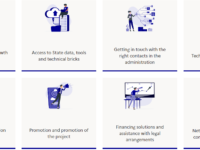Less than 5% of Small Business (SBs) in Australia take out formal intellectual property protection, with many small business owners putting themselves at risk due to a lack of awareness about the need for Intellectual Property, especially at the point of establishing their business. TM Embed aims to engage these small businesses at critical points of their business journey by building awareness, educating them about trade marks, and simplifying the way in which they engage with the trade ma
Innovation Tag: Public Service Delivery
Launched by President Emmanuel Macron at the Open Government Partnership (OGP) Summit in 2021, the Citizen Initiative Accelerator supports citizen-led projects that serve the public good. After being screened by the public administration and a panel of citizens, the selected projects benefit from a 6-month tailor-made support to accelerate their development. This unique program promotes new modes of cooperation between the state and civil society in order to achieve what we call "augmented…
Nationwide the unpaid care burden falls disproportionately on women, reaching alarming proportions in the city of Bogotá: 30% of the city's female population are full-time unpaid caregivers, of which 90% are low-income; 33% lack time for self-care; and 70% hold only primary school. To mitigate undesired effects, and that the burden of the home-care increases the vulnerability of (already) neglected women, the city of Bogotá has recently launched the "Care Block" initiative to centralize key…
An Economic Reform Governance Model to reform design and delivery of citizen-and business-centric public services was introduced in 2016. Aim of the Model was to eliminate barriers, ensure transparency, develop digital public services and expand competitiveness through increasing engagement of civil society and businesses in the reform process. Implementing 136 reform initiatives by passing 55 legal acts enabled the government to create more favorable social-economic opportunities for citizens.
The CXEC is a cohort program that brings together US Department of Agriculture (USDA) staff across America to learn about customer experience (CX) and develop new solutions to common CX issues faced by American farmers. In doing so, it creates a unique space for collaboration, knowledge-sharing, and the development of locally-informed solutions.
This is an account of how managers became enthused and took responsibility for leading change and co-creating it with their staff within the Planning service. The approach they took was in stark contrast with their standard and legislative based thinking and obvious digital solutions. They incorporated new management behaviours and team working. Waste was dramatically cut, and the staff environment created a highly motivating culture. The impact of the customers needs was profound.
The Government of Aruba developed a dynamic policy framework based on 10 key building blocks that jointly form a road map setting the direction for Aruba’s digitization strategy. The publication of the road map marks the culmination of the government’s preparatory implementation work over the past 3 years. At its core, the strategy is about meeting the needs of people within a service model that is fit for the demands of the 21st century.
The Reducing Friction in Trade (RFIT) project was initiated in March 2019 as a proof of concept to establish how blockchain distributed ledger technology and associated technologies can be used to seamlessly integrate supply chain data with HM Revenue & Customs and the Food Standards Agency’s systems. The project intends to do so by guaranteeing the timeliness and provenance of critical data and avoiding the need for discrete declarations.
The COVID-19 pandemic and lockdown measures led to an increase in gender-based violence worldwide. In this context, the Government of Chile and Argentina, in an international collaboration with Facebook, took on the challenge of creating a silent channel to provide emotional support and information to women who live with their aggressor. In Chile, the project was led by
the Ministry of Women and Gender Equality, and the Government (Innovation) Laboratory.
The Borderlands Partnership, comprising five local authorities on the border of England and Scotland, secured an innovative growth deal with the UK and Scottish Governments: the Borderlands Inclusive Growth Deal. The Deal will bring in up to £452m of fresh investment to support inclusive and sustainable growth across the Borderlands region and is anticipated to boost the region’s economy by £1.1 billion and create 5,500 additional job opportunities. It is the cross-border growth Deal in the…








